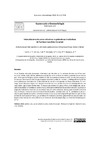Please use this identifier to cite or link to this item:
https://accedacris.ulpgc.es/jspui/handle/10553/76002
| Title: | Intercalaciones de polvo sahariano en paleodunas bioclásticas de Fuerteventura (Islas Canarias) | Other Titles: | Saharan dust interbedded in bioclastic palaeodunes in Fuerteventura, Canary Island | Authors: | Criado, C. Torres, J. M. Hansen Machín,Alex Roberto Lillo, P. Naranjo Cigala, Agustín |
UNESCO Clasification: | 250607 Geomorfología 250618 Sedimentología |
Keywords: | Paleodunes Dust Blood Rain Upper Pleistocene Fuerteventura, et al |
Issue Date: | 2012 | Journal: | Cuaternario y Geomorfologia | Abstract: | Aeolian sand dunes deposits are very well developed in Lanzarote and Fuerteventura Islands. There, active and fossil (palaeodunes) aeolian sand formations can be distinguished. These have been used as sand quarry showing very interesting cross-sections. An accuracy survey allows differentiate silty layers, pale brown coloured, with presence of land snails remains and insects nets. The literature defined these layers as paleosoils issued from the weathering of bioclastic sands; others authors explained them as Saharan clays. The geochemical, mineralogical and grain-size study carried out on a cross-section located on Corralejo (Fuerteventura) point to a mixture between bioclastic sand-dunes and Saharan dust, composed by silt fraction including quartz as the most important mineral. The study include grain-size, geochemical and mineralogical analysis (XRD) and two radiocarbon ages got on shells of terrestrial snails. These, included on silty layers, has been dated 16 ka and 13 ka BP. The comparison of these data with grain-size parameters of actual sand-dunes from Corralejo Natural Park allow presume a weak wind velocity during the arid phases of Late Pleistocene times; indeed, the presence of silty layers, interbedded between sandy layers is an evidence of important deposition of dust airborne from Sahara desert; geochemical and mineralogical evidences point to frequents arrival of African fine fraction. On the other hand, the close association between sahara dust and animal remains ( insect nets and shell of Theba geminate) is an evidence of more dense vegetation cover. We suggest that the presence of these silty layers can be related with more humid palaeoclimates producing a massive deposition of Saharan dust as blood rain in a time when the polar front move southward in relation with changes in the atmosphere dynamic. En las Canarias orientales (Lanzarote y Fuerteventura) abundan las formaciones dunares, tanto funcionales como relictas. Estas últimas, debido a su utilización como canteras de áridos, presentan secuencias de gran interés geomorfológico y paleoclimático. En ellas se reconocen estratos de color marrón claro y aspecto terroso que contienen conchas de gasterópodos terrestres y nidos de insectos. La bibliografía los identifica como paleosuelos derivados de la alteración de las arenas o con aportes arcillosos saharianos. Sin embargo, no se observan rasgos que indiquen la existencia en el pasado de procesos edafogenéticos que hayan dado lugar a estas formaciones. El estudio granulométrico, geoquímico y mineralógico de una secuencia localizada en Corralejo (Fuerteventura), en el que se diferencian dos estratos terrosos, apunta a un origen derivado de la mezcla de arenas bioclásticas con polvo sahariano (dust), predominando en éste la fracción limosa y siendo el cuarzo el mineral más destacable. Las dataciones de 14C, realizadas sobre conchas de gasterópodos terrestres, permiten establecer una secuencia temporal finipleistocena para los dos estratos de textura areno‐franca, que se habrían formado en situaciones paleoclimáticas caracterizadas por deposiciones masivas de polvo sahariano, en forma de lluvia de sangre, bajo un clima más húmedo que el actual. |
URI: | https://accedacris.ulpgc.es/handle/10553/76002 | ISSN: | 0214-1744 | Source: | Cuaternario y Geomorfologia [ISSN 0214-1744], v. 26 (1-2), p. 73-88, (2012) |
| Appears in Collections: | Artículos |
SCOPUSTM
Citations
19
checked on Jun 8, 2025
WEB OF SCIENCETM
Citations
16
checked on Feb 25, 2024
Page view(s) 5
225
checked on Oct 31, 2024
Download(s)
97
checked on Oct 31, 2024
Google ScholarTM
Check
Share
Export metadata
Items in accedaCRIS are protected by copyright, with all rights reserved, unless otherwise indicated.
